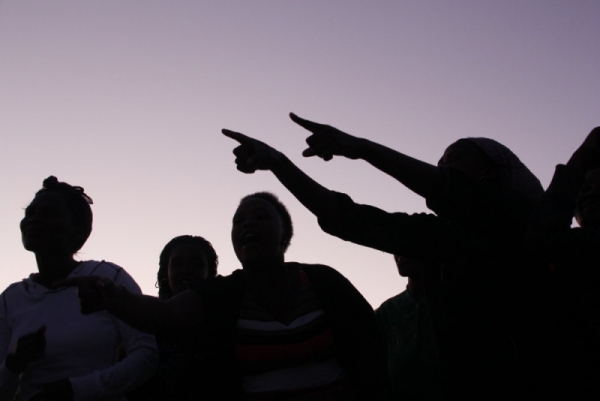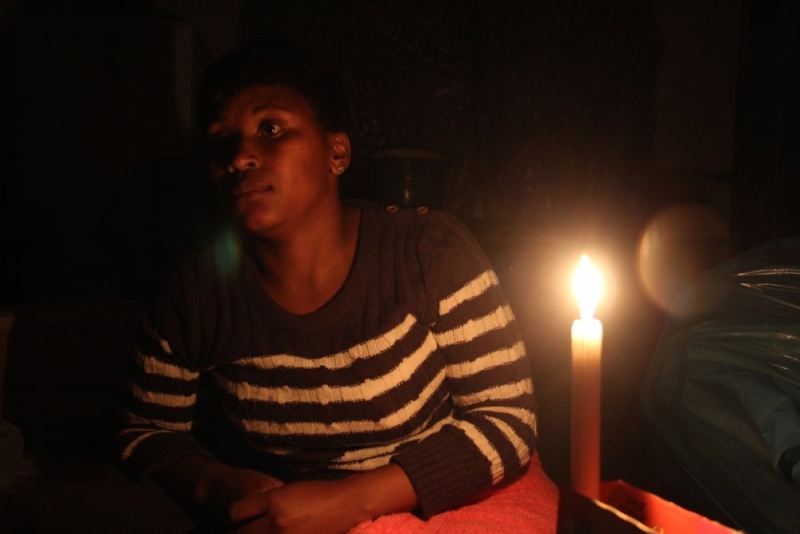Wolwerivier gets its first taste of violence

It was a weekend of flaring emotions and violence at Wolwerivier relocation area. On Friday, residents protested against the City’s relocation of strangers into empty units sought by the community to alleviate the overcrowding at the settlement. Rubber bullets were fired into crowds containing mostly women and children. People were arrested and beaten when they refused to disperse.
An eighteen-year-old schoolboy, who says he was beaten up by police, does not want his name mentioned. Nor does he want to report the two police officers who he says pushed him to the ground, kicked him, slapped him with open hands and pepper sprayed him in his face.
“He is writing matric at a decent school,” says his mother, a leader from the community removed to Wolwerivier relocation camp in July this year. On Tuesday, her son is writing his final history paper. As she speaks on his behalf, he stands by quietly, his eyes still puffy from the pepper spray.
“He does not want trouble, because it took a lot for him to get so far with his schooling. In some ways we can understand that, but what has happened here to him and to our community tonight cannot be swept away.”
Encouraged by his neighbours who have gathered around, the boy recounts the events which ended in the assault. It was late afternoon. Police were chasing people through the alleyways between the rows of City built shacks, and firing rubber bullets. The boy had only been vaguely aware of the stand-off between residents and Metro police, backed up by SAPS, on the eastern end of the settlement: an uninhabited area, where structures stand empty and padlocked. When chaos broke out, he did not join the people as they ran from the police, past him. He says an officer aimed a gun at him. He told the officer that he was not part of the protest, but the officer accused him of lying and then, with another officer, assaulted him.
Since around 280 families were removed from Skandaalkamp informal settlement to Wolwerivier in July this year, the community has had a fractious relationship with the City of Cape Town. Central to the dissatisfaction of many former Skandaalkamp families has been the issue of overcrowding. The community has persistently demanded more units and space from the City over the last few months. There are still empty units, and private security guards and the City’s Anti-Land Invasion Unit, which set up a mobile office at the relocation area, have had a constant presence in Wolwerivier, securing these units against occupation. It is this tension that underlies Friday’s violence.
At the Skandaalkamp informal shack settlement near Vissershok landfill site, from which these families were removed and relocated on the backs of trucks so that the dump could be extended, there was space enough to extend and build new units or rooms as families grew and children came of age. In many instances at Wolwerivier large families and unrelated adults are expected to share small open plan units allocated by the City.
“We have no privacy. I have a child of my own. My partner lives with me. And yet, we have been forced to live with my parents and my little brother in such a tiny space. This is happening everywhere, and it is not healthy for relationships in families,” says Michaela Dick, a nineteen-year-old mother who, along with her partner, had established a home independent of her parents several months before the move.
It is now two hours after the police opened fire with rubber bullets and charged at the community. Four people have been arrested and taken away. As Dick speaks in the gathering dusk, a group of women still toyi-toyi. They make gestures at the police who remain armed on the outskirts of Wolwerivier.
The group from Skandaalkamp have been joined in their protest by a small contingent of Wolwerivier farm’s dwellers who also have an interest in the housing units at the relocation camp. They live without electricity, in shacks and dilapidated houses – some with cracks in walls large enough for one’s fist to fit through – on the farm near to where the settlement has been built. When it rains, complains long-time resident Daisy Pinto, the water seeps into the houses and rises from ground to saturate the shack and cottage floors. These people also have fears of being cooped up too many to a unit. But the concrete floors, electricity boxes and promises of showers in every unit are an attractive proposition.
“We were very excited when Anton Terblanche (from the City’s Human Settlements) first came to tell us about the new places for us,” says Pinto, 55, who has lived on the farm in a cottage that is “falling to pieces” for 15 years. She explains that the Wolwerivier farm dwellers had expected to relocate last week, but that did not happen.
“Now we see them bringing strange people from faraway to take up places that we have waited for so long. They did not discuss this with us, and so the community is concerned because they do not understand and they do not feel that it is fair on us.”
It was the City’s allocation of seven Wolwerivier units to families from Blikkiesdorp, in Delft, that sparked the confusion, protest and violent retaliation from Metro police on Friday.
Community leader Thozama Qobongwana says “We as the representatives had no idea that this was coming. So obviously the community were concerned because there has been a need to negotiate and deal with the overcrowding issue. We are disappointed, because the City has failed to communicate with us and just does what it pleases even as people are suffering here.”
As darkness falls on Wolwerivier on Friday, the protesters dissipate. A small group of Metro police officers have remained to monitor the situation, but they are relaxed. They chat loudly in the light shining through the open sliding door of a minivan, near the camp’s entrance.
In one of the newly occupied structures, 33-year-old Sindiswa Blaai from Blikkiesdorp, in Delft, sits on a couch by candlelight listening to the unfamiliar sounds of her new surroundings outside. She is aware that it was her arrival that precipitated the protests, the police violence and the intensified anger thereafter. She feels exposed and afraid, because she does not know the sentiments of the Wolwerivier community into which she has moved. She cannot know whether plans are being attached to attack and eject her and her neighbours during the course of the night. Wolwerivier has no street lights and is very dark at night. She is very afraid, she admits, and does not go outside. She does not unpack the boxes which lie neatly stacked beside the couch.
 Sindiswa Blaai moved to Wolwerivier from Blikkiesdorp last week. Photo by Daneel Knoetze.
Sindiswa Blaai moved to Wolwerivier from Blikkiesdorp last week. Photo by Daneel Knoetze.
“They are Xhosas so we thought that they would accept us. They are angry because they have not enough space for their own people. But we are also homeless,” she says, and explains the reasons for her desperate situation.
Originally from a shack in Site C in Khayelitsha, Blaai moved to the then newly established Blikkiesdorp relocation area after heavy rains and flooding in 2009. After years of co-existence, Blikkiesdorp erupted with in-fighting last week after a coloured Afrikaner was shot and killed during an altercation with a Xhosa man. Xhosas, like Blaai, are in a minority at the camp. They were besieged and held hostage in their homes. Their lives were threatened. Finally, they were asked to leave and gladly accepted an offer from the City to be relocated to Wolwerivier.
“But now again we are afraid for our lives,” she said on Friday evening.
Wolwerivier’s residents continued to channel their anger and frustration into action beyond Friday’s protest. But they left Blaai and the six other households alone. From as early as Friday, when tensions were at their highest, community leaders emphasised that they have nothing against the people who have been relocated there. It is the City’s refusal to negotiate and inform that is driving the protest, says Qobongwana.
Reports from people at Wolwerivier suggest that, throughout this weekend, the padlocks of empty units were struck down, and furniture was carried through the open doors. The City responded by evicting the occupiers and securing the units once more.
“These people are frustrated, and we do understand that. Just as they have understood us, and we are so grateful,” says Blaai over the phone on Sunday.
“I am still waiting for electricity to be connected, so one of the ladies here said I could come to iron my work clothes at her home. I thought that was very kind.”
Both the South African Police Service and the City of Cape Town were approached for comment over the weekend. Neither have yet responded to the request.
Support independent journalism
Donate using Payfast

Don't miss out on the latest news
We respect your privacy, and promise we won't spam you.
Next: Top dancers show Gugulethu kids their moves
Previous: We’re all scared, say Blikkiesdorp residents

This article is licensed under a Creative Commons Attribution-NoDerivatives 4.0 International License.
